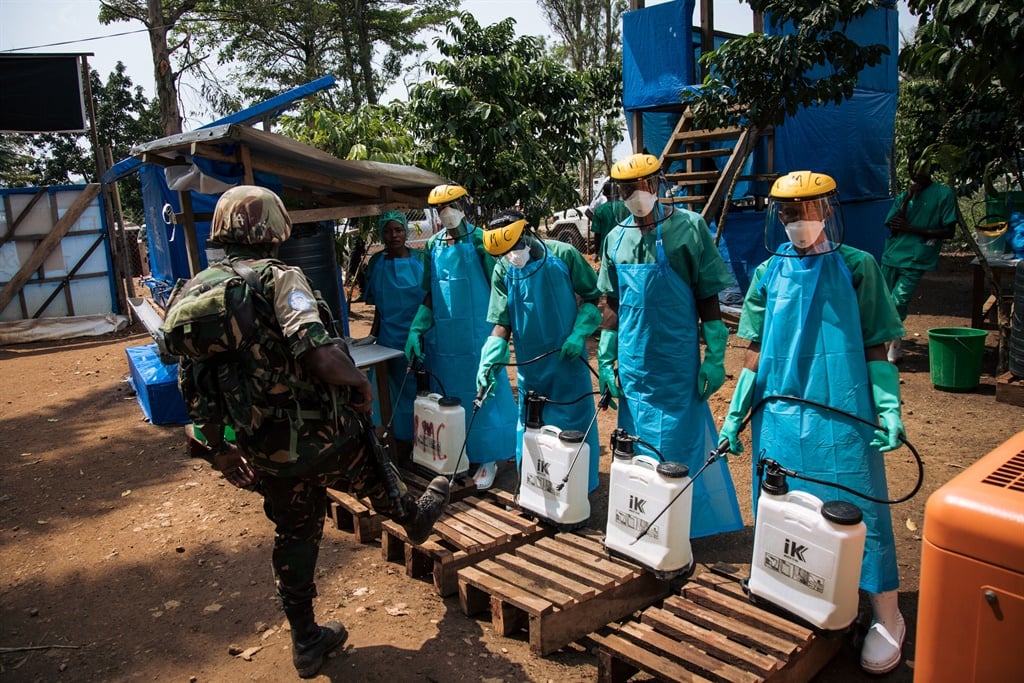
The key to containing the latest Ebola outbreak within Uganda and its spread to other countries is ensuring that we don't forget the deadly lessons learnt during the Covid pandemic, write Rueben Lifuka and Peter Wandera.
While the world gradually adapts to life with Covid-19, another deadly infectious disease has reared its head again. An outbreak of Ebola – which has a mortality rate of more than two in five – has been detected in Uganda. It has already killed dozens, and the government has begun to impose lockdowns in a bid to stop the spread. The international health community is also on high alert, desperate to prevent a repeat of the last two years.
But the key to containing this outbreak within Uganda and its spread to other countries is ensuring that we don't forget the deadly lessons learnt during the pandemic. High up on that list is preventing corruption.
Bribes and corruption
We saw only too clearly how corrupt practices during the response to Covid weakened already overwhelmed health systems in our countries and others around the world. From governments' buying substandard or overpriced medicines, and protective equipment to having to pay bribes for medical treatment, it put the lives of millions at risk – particularly the most vulnerable, who discovered that even when a treatment or vaccine became available, there were unexpected and unaffordable 'fees'.
Transparency International's research into lessons learned from the pandemic response in Uganda found that one in ten reported paying a bribe to access a vaccine. The amount needed for a bribe for a full course of Covid-19 vaccination was potentially devastating. The $1.80 (just over R32) charged (at minimum) equates to 95% of the money earned per day by those living on the national poverty line ($1.90 (R34) per person per day). A disturbing trade in bogus vaccination certificates also developed
In Zambia, arrests have just been made around an alleged $18 million (R322m) defrauding of the government involving faulty Covid-19 test kits. Ambulance tricycles reportedly bought at inflated prices remain unused with grass sprouting from them. Officials from Zambia’s procurement department were suspended last year, after the World Bank's concerns that response funding could be siphoned off or wasted in Zambia came to pass.
Health services still stretched from Covid
A robust corruption-free response to Ebola is all the more important this time around. Health services in Uganda and the region are still stretched from Covid. Ebola will add to the pressure.
It will not be easy. Corruption has too often been tolerated as a cost of doing business, particularly in humanitarian situations. Especially where there is a perceived trade-off between urgency and due diligence. But preventing corruption is the only way to ensure an effective and efficient response, even more so in times of emergency. And there is little question this is urgent. This Ebola outbreak risks becoming a regional emergency with prolonged economic and social consequences unless the spread is contained. But with currently no approved vaccine for the virus strain involved that will be hard, making it even more important that corruption is kept at bay.
READ | Uganda says two more Ebola cases confirmed in Kampala hospital
Anti-corruption procedures and accountability mechanisms already exist that are not burdensome. Off-the-shelf systems, if integrated, can ensure humanitarian assistance is used effectively.
In the procurement of medical supplies for example, designing a separation of duties between finance teams and decision-making committees stops at the source the very conflicts of interest resulting in corruption of the kind currently being prosecuted in Zambia. At the height of the pandemic, contracts were awarded to suppliers with no experience in medical supplies. The low grade face masks and uninspected oxygen cylinders delivered endangered health workers and the public. A repeat of such scenarios during this outbreak of Ebola could have implications beyond the borders of Uganda.
A critical moment
Accountability can be crowdsourced through engaging civil society organisations, journalists and state anti-corruption bodies. Transparency International's Global Health programme has supported more than 100 procurement deals, and construction works to be checked for corruption risk, with the majority of flagged issues successfully rectified.
Governments from around the world are in the early stages of drawing up a prevention, preparedness and response accord which is intended to shape global responses to future pandemics.
We welcome such a treaty and the recognition that the world needs to have an aligned, if not united, approach. We believe it will help both our countries, Uganda and Zambia, prepare for future disease outbreaks and avoid the scramble to buy vaccines which took place with Covid.
However, our experience has shown us that fighting corruption must be a key principle in the accord if we are serious about creating a more resilient global response. That must go hand in hand with funding and support for affected countries – and a say for those worst hit in how those fundings decisions are made.
This is a critical moment to shape how the world responds to future pandemics and deadly disease outbreaks and for the safety of people around the world. Let’s hope the lessons from Covid-19 have been learnt.
- Rueben Lifuka is Vice Chair of Transparency International, and Peter Wandera is Director of Transparency International Uganda.
*Want to respond to the columnist? Send your letter or article to opinions@news24.com with your name and town or province. You are welcome to also send a profile picture. We encourage a diversity of voices and views in our readers' submissions and reserve the right not to publish any and all submissions received.
Disclaimer: News24 encourages freedom of speech and the expression of diverse views. The views of columnists published on News24 are therefore their own and do not necessarily represent the views of News24.




 Publications
Publications
 Partners
Partners
























